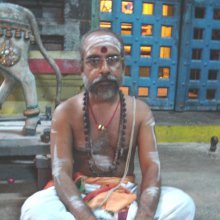Manipuraka, Maṇipūraka, Mani-puraka: 5 definitions
Introduction:
Manipuraka means something in Hinduism, Sanskrit. If you want to know the exact meaning, history, etymology or English translation of this term then check out the descriptions on this page. Add your comment or reference to a book if you want to contribute to this summary article.
Images (photo gallery)
In Hinduism
Shaktism (Shakta philosophy)
Source: Google Books: Manthanabhairavatantram1) Maṇipūraka (मणिपूरक) or Maṇipura refers to “the city of gems” which is the Cakra (wheel) above it located in the navel, according to the Manthānabhairavatantra, a vast sprawling work that belongs to a corpus of Tantric texts concerned with the worship of the goddess Kubjikā.
2) Maṇipūraka (मणिपूरक) [Maṇipūra?] or Maṇipūrakacakra refers one of the “sixteen stations of the ascent of kuṇḍalinī” according to the Manthānabhairavatantra, a vast sprawling work that belongs to a corpus of Tantric texts concerned with the worship of the goddess Kubjikā.—Accordingly, “[...] (3) Above that, having abandoned Kuṇḍalī, one should think of the (Wheel) Full of Gems (maṇipūraka) (in the navel). It is a mass of radiant energy, like the Fire of Time. There, in the middle, one should place the excellent and auspicious Void of (all) four colours that manifests according to the nature (of each entity). [...] (Perfect) contemplation (samādhi) is with (these) sixteen aspects and is (attained) within the form of the sixfold deposition (ṣoḍhānyāsa). He who knows this is (a veritable) Lord of Yogis, the others (who do not) are (just) quoting from books. Once attained the plane that is Void and Non-void, the yogi is freed from bondage”.

Shakta (शाक्त, śākta) or Shaktism (śāktism) represents a tradition of Hinduism where the Goddess (Devi) is revered and worshipped. Shakta literature includes a range of scriptures, including various Agamas and Tantras, although its roots may be traced back to the Vedas.
Languages of India and abroad
Sanskrit dictionary
Source: Cologne Digital Sanskrit Dictionaries: Monier-Williams Sanskrit-English DictionaryMaṇipūraka (मणिपूरक):—[=maṇi-pūraka] [from maṇi] n. Name of a mystical circle on the navel, [Catalogue(s)]
[Sanskrit to German]
Sanskrit, also spelled संस्कृतम् (saṃskṛtam), is an ancient language of India commonly seen as the grandmother of the Indo-European language family (even English!). Closely allied with Prakrit and Pali, Sanskrit is more exhaustive in both grammar and terms and has the most extensive collection of literature in the world, greatly surpassing its sister-languages Greek and Latin.
Kannada-English dictionary
Source: Alar: Kannada-English corpusMaṇipūraka (ಮಣಿಪೂರಕ):—[noun] = ಮಣಿಪೂರ - [manipura -] 2.
Kannada is a Dravidian language (as opposed to the Indo-European language family) mainly spoken in the southwestern region of India.
See also (Relevant definitions)
Partial matches: Puraka, Mani.
Starts with: Manipurakacakra.
Full-text: Manipura, Manipurakacakra, Shadadhara, Tejorashi, Caturvarna, Manipuracakra, Kalagni.
Relevant text
Search found 6 books and stories containing Manipuraka, Maṇipūraka, Mani-puraka, Maṇi-pūraka; (plurals include: Manipurakas, Maṇipūrakas, purakas, pūrakas). You can also click to the full overview containing English textual excerpts. Below are direct links for the most relevant articles:
Cidgaganacandrika (study) (by S. Mahalakshmi)
Verse 126 [Cidambaragatā Śakti’s four forms in Gross body] < [Chapter 3 - Third Vimarśa]
Verse 140 [Ṣaṭcakra Mānasa Sthiti] < [Chapter 3 - Third Vimarśa]
Verse 96 [Praṇava produced by Cakrapañcaka in Kuṇḍalinī] < [Chapter 3 - Third Vimarśa]
The Garuda Purana (abridged) (by Ernest Wood)
Thirty minor Upanishads (by K. Narayanasvami Aiyar)
Yoga-kundalini Upanishad of Krishna-Yajurveda, Chapter III
Hamsa Upanishad of Shukla-Yajurveda
The Skanda Purana (by G. V. Tagare)
Chapter 254 - Tāṇḍava Dance of Śaṅkara < [Section 1 - Tīrtha-māhātmya]
The Religion and Philosophy of Tevaram (Thevaram) (by M. A. Dorai Rangaswamy)
Chapter 4 - Tamil and Religion < [Volume 4.1.2 - The conception of Paramanaiye Paduvar]
Chapter 1 - The ladder of love and Agamaic worship < [Volume 4.2.2 - Philosophy of Soul]
Serpent Power (Kundalini-shakti), Introduction (by Arthur Avalon)
